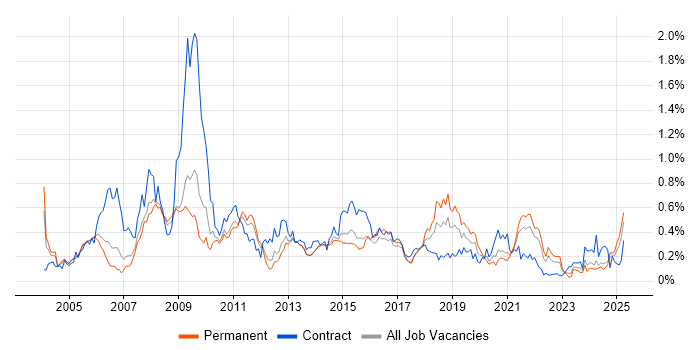e-Learning
England > Yorkshire
The table below looks at the prevalence of the term e-Learning in permanent job vacancies in Yorkshire. Included is a benchmarking guide to the salaries offered in vacancies that cited e-Learning over the 6 months leading up to 4 March 2026, comparing them to the same period in the previous two years.
| 6 months to 4 Mar 2026 |
Same period 2025 | Same period 2024 | |
|---|---|---|---|
| Rank | 170 | 141 | 193 |
| Rank change year-on-year | -29 | +52 | +100 |
| Permanent jobs citing e-Learning | 12 | 5 | 5 |
| As % of all permanent jobs in Yorkshire | 0.28% | 0.21% | 0.11% |
| As % of the Miscellaneous category | 0.97% | 0.55% | 0.33% |
| Number of salaries quoted | 5 | 3 | 5 |
| 10th Percentile | - | £37,250 | - |
| 25th Percentile | £26,000 | £40,625 | £24,000 |
| Median annual salary (50th Percentile) | £35,000 | £47,500 | £25,250 |
| Median % change year-on-year | -26.32% | +88.12% | +1.00% |
| 75th Percentile | - | £49,375 | £42,500 |
| 90th Percentile | - | £49,750 | £44,000 |
| England median annual salary | £40,000 | £50,000 | £40,000 |
| % change year-on-year | -20.00% | +25.00% | -13.04% |
All Generic Skills
Yorkshire
e-Learning falls under the General and Transferable Skills category. For comparison with the information above, the following table provides summary statistics for all permanent job vacancies requiring generic IT skills in Yorkshire.
| Permanent vacancies with a requirement for generic IT skills | 1,231 | 904 | 1,518 |
| As % of all permanent jobs advertised in Yorkshire | 28.26% | 37.87% | 32.37% |
| Number of salaries quoted | 647 | 414 | 1,162 |
| 10th Percentile | £26,500 | £26,250 | £27,000 |
| 25th Percentile | £32,000 | £38,500 | £35,000 |
| Median annual salary (50th Percentile) | £51,000 | £50,000 | £51,000 |
| Median % change year-on-year | +2.00% | -1.96% | -7.27% |
| 75th Percentile | £69,125 | £73,886 | £69,979 |
| 90th Percentile | £92,500 | £96,250 | £83,630 |
| England median annual salary | £55,200 | £62,500 | £55,000 |
| % change year-on-year | -11.68% | +13.64% | -15.38% |
e-Learning
Job Vacancy Trend in Yorkshire
Historical trend showing the proportion of permanent IT job postings citing e-Learning relative to all permanent IT jobs advertised in Yorkshire.

e-Learning
Salary Trend in Yorkshire
Salary distribution trend for jobs in Yorkshire citing e-Learning.

e-Learning
Job Locations in Yorkshire
The table below looks at the demand and provides a guide to the median salaries quoted in IT jobs citing e-Learning within the Yorkshire region over the 6 months to 4 March 2026. The 'Rank Change' column provides an indication of the change in demand within each location based on the same 6 month period last year.
| Location | Rank Change on Same Period Last Year |
Matching Permanent IT Job Ads |
Median Salary Past 6 Months |
Median Salary % Change on Same Period Last Year |
Live Jobs |
|---|---|---|---|---|---|
| West Yorkshire | -36 | 6 | £35,000 | -17.65% | 6 |
| North Yorkshire | +7 | 3 | - | - | 1 |
| e-Learning England |
|||||
e-Learning
Co-Occurring Skills & Capabilities in Yorkshire by Category
The following tables expand on the one above by listing co-occurrences grouped by category. They cover the same employment type, locality and period, with up to 20 co-occurrences shown in each category:
